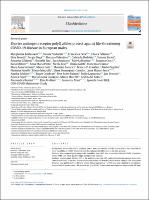Shorter androgen receptor polyQ alleles protect against life-threatening COVID-19 disease in European males
Author
Date
2021-03Permanent link
https://hdl.handle.net/11351/6156DOI
10.1016/j.ebiom.2021.103246
ISSN
2352-3964
WOS
000634284800009
PMID
33647767
Abstract
Background While SARS-CoV-2 similarly infects men and women, COVID-19 outcome is less favorable in men. Variability in COVID-19 severity may be explained by differences in the host genome. Methods We compared poly-amino acids variability from WES data in severely affected COVID-19 patients versus SARS-CoV-2 PCR-positive oligo-asymptomatic subjects. Findings Shorter polyQ alleles (≤22) in the androgen receptor (AR) conferred protection against severe outcome in COVID-19 in the first tested cohort (both males and females) of 638 Italian subjects. The association between long polyQ alleles (≥23) and severe clinical outcome (p = 0.024) was also validated in an independent cohort of Spanish men <60 years of age (p = 0.014). Testosterone was higher in subjects with AR long-polyQ, possibly indicating receptor resistance (p = 0.042 Mann-Whitney U test). Inappropriately low serum testosterone level among carriers of the long-polyQ alleles (p = 0.0004 Mann-Whitney U test) predicted the need for intensive care in COVID-19 infected men. In agreement with the known anti-inflammatory action of testosterone, patients with long-polyQ and age ≥60 years had increased levels of CRP (p = 0.018, not accounting for multiple testing). Interpretation We identify the first genetic polymorphism that appears to predispose some men to develop more severe disease. Failure of the endocrine feedback to overcome AR signaling defects by increasing testosterone levels during the infection leads to the polyQ tract becoming dominant to serum testosterone levels for the clinical outcome. These results may contribute to designing reliable clinical and public health measures and provide a rationale to test testosterone as adjuvant therapy in men with COVID-19 expressing long AR polyQ repeats.
Keywords
Coronavirus SARS-CoV-2; COVID-19; 2019-nCoV; Androgen receptor gene; Viral infection and host genomeBibliographic citation
Baldassarri M, Picchiotti N, Fava F, Fallerini C, Benetti E, Daga S, et al. Shorter androgen receptor polyQ alleles protect against life-threatening COVID-19 disease in European males. EBioMedicine. 2021 Mar;65:103246.
Audience
Professionals
This item appears in following collections
- Col·lecció especial COVID-19 [945]
- HVH - Articles científics [4476]
- VHIR - Articles científics [1751]
The following license files are associated with this item:

 Private area
Private area Contact Us
Contact Us








